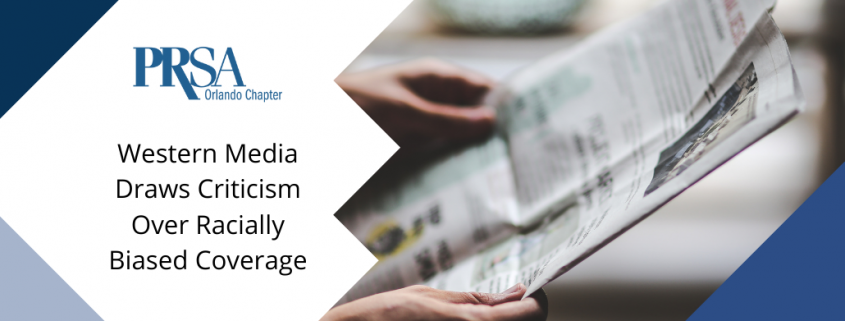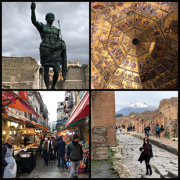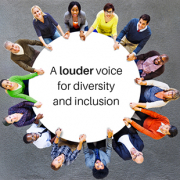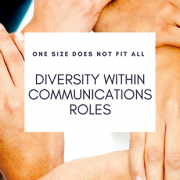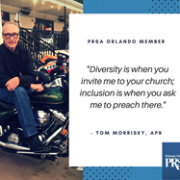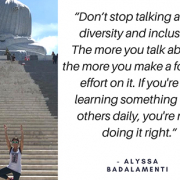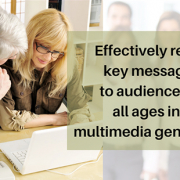Western Media Draws Criticism Over Racially Biased Coverage
By PRSA Orlando Assistant Treasurer Veronica Figueroa
Last month, PRSA Orlando hosted its first in-person program since 2020. The program, “How Communicators Can Advance Equity With Storytelling,” brought together a dynamic panel of DEI leaders and educators in Central Florida to discuss how communicators can use storytelling, one of the most universal human experiences, to help brands do more.
The panel, moderated by PRSA board member Jaylen Christie, consisted of Darryl E. Owens, Director of Communications at Beacon College; Dr. Jennifer Sandoval, Associate Professor of Communications at UCF; and Shayla Cannady, Assistant Director of Public Relations at OCPS.
Key takeaways from the discussion included:
- Communicators should boldly tell authentic human stories that go beyond visual diversity (age, race, gender, or ethnicity), and also consider stories of invisible differences such as neurodiversity.
- The presence of “different” (diversity) does not always mean that you’re sharing power. Sharing space without sharing power is tokenism.
- Diversity, equity, and inclusion should be everyone’s job, not just a human resources function.
- Audit your team, content, and spokespeople to ensure there is no implicit bias in your materials and campaigns.
- Leadership does not equal authority on a subject. Bring other people in to share their input and experiences.
The discussion couldn’t have come at a more relevant time. Many of us have been glued to our screens over the past few weeks, learning more information about the Russian invasion of Ukraine, the strong resolve of the Ukrainian people, and finding ways to help.
However, the coverage of the invasion by western media has drawn criticism for reporters openly displaying their biases in the language they use to describe the crisis.
“This isn’t a place, with all due respect, like Iraq or Afghanistan, that has seen conflict raging for decades. This is a relatively civilized, relatively European – I have to choose those words carefully, too – city, one where you wouldn’t expect that, or hope that it’s going to happen,” said CBS News senior foreign reporter Charlie D’Agata on live television.
Comedian Trevor Noah, the host of The Daily Show, recently discussed the biased coverage. In his opening monologue, he responded to D’Agata’s comments saying, “wow, that was you choosing your words carefully? That was the careful version? What were you going to say if you weren’t choosing your words carefully? ‘I just hope the next time this happens, it happens back in the Middle East where it belongs.'”
“These are refugees from Ukraine… They’re Christian, they’re white, they’re very similar,” reported NBC news correspondent Kelly Cobiella.
On France’s BFM TV, journalist Phillipe Corbé said, “We’re not talking here about Syrians fleeing the bombing of the Syrian regime backed by Putin. We’re talking about Europeans leaving in cars that look like ours to save their lives.”
The overt racism went beyond media coverage. Bulgaria’s prime minister did not leave much to interpretation when he plainly said Ukrainian refugees are “intelligent, they are educated. […] This is not the refugee wave we have been used to, people we were not sure about their identity, people with unclear pasts, who could have been even terrorists.”
Likewise, David Sakvarelidze, former deputy prosecutor general in Ukraine, told a presenter on BBC, “it’s really emotional for me because I see European people with blue eyes and blonde hair being killed, children being killed every day with Putin’s missiles and his helicopters and rockets.”
The biased coverage was called out by the US-based Arab and Middle Eastern Journalists Association (AMEJA). In a statement released by the group, they condemned and rejected “orientalist and racist implications that any population or country is ‘uncivilized’ or bears economic factors that make it worthy of conflict. This type of commentary reflects the pervasive mentality in western journalism of normalizing tragedy in parts of the world such as the Middle East, Africa, South Asia, and Latin America. It dehumanizes and renders their experience with war as somehow normal and expected.”
“Inaccurate and disingenuous comparisons only serve to inflame stereotypes and mislead viewers, and they ultimately perpetuate prejudicial responses to political and humanitarian crises,” AMEJA concluded their statement.
The desire to grant humanitarian aid to a group of people should not come because they are similar to “us.” Words matter. When journalists and news correspondents express their shock and disbelief at “civilized” countries coming under siege, it erases the experiences of millions of refugees from around the world who have lived through conflict and war. War does not discriminate, and neither should the language coming from western outlets.
The coverage that has come out of this conflict can serve as an opportunity for newsrooms to diversify, make space for and elevate other voices, and address implicit bias within their teams. In the same manner that public relations professionals seek continuing education opportunities through PRSA to refine their skills, journalists should use this as an opportunity for growth.
As communicators, it is our ethical duty to be advocates for those whose stories we are sharing. We must seek to treat them with the humanity, compassion, and equity they deserve. This is a great time to remind ourselves about our PRSA Code of Ethics, which helps to guide and maintain the integrity of our profession.

